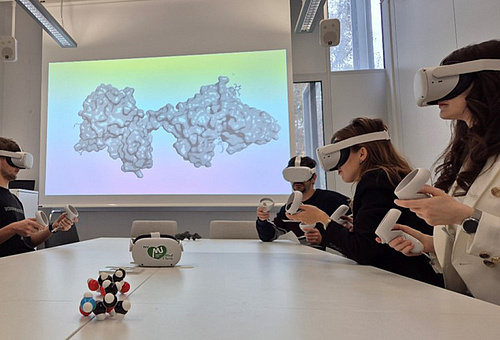-
The University
- Welcome
- Who we are
- Media & PR
- Studying
-
Research
- Profile
- Infrastructure
- Cooperations
- Services
-
Career
- Med Uni Graz as an Employer
- Educational Opportunities
- Work Environment
- Job openings
-
Diagnostics
- Patients
- Referring physicians
-
Health Topics
- Health Infrastructure

Innovative teaching projects: Making molecular structures understandable
Together, we look back on the innovative teaching projects at the Medical University of Graz that have won awards to date. This time, we focus on the project ‘Making molecular structures comprehensible – implementing virtual reality in teaching’ by Christoph Nusshold, Chair of Medical Chemistry.
One of the main areas of research at the Chair of Medical Chemistry is the computer-aided design and synthesis of artificial molecules for use in the treatment of a wide variety of diseases. Understanding the three-dimensional structure of small molecules and macromolecules and, as a result, uncovering their interaction at the molecular level is a key step in this process. Only knowledge and understanding of the three-dimensional structure of target molecules enable the precise and targeted development of active substances.
In order to convey this necessary understanding of the structure of complex three-dimensional molecules to prospective medical students in the best possible way, Christoph Nusshold and his colleagues Christine Rossmann and Pedro Sánchez Murcia decided to use virtual reality (VR) headsets with the Nanome© visualisation software.
This innovative teaching method has already been used in the course ‘Natural Substances in Silico’ as part of PT NAWI II. Here, students work in small groups on case studies, with the aim of elucidating the underlying molecular causes of a disease (e.g. a mutation that leads to the development of a carcinoma). In order to understand the structure and function of the biomolecules being studied, the students visualised them in three dimensions using VR for the first time, rather than in two dimensions on a computer as usual.
This allows students to literally ‘immerse’ themselves in the molecular structure of the respective macromolecules or ‘enter’ them. Since the individual group participants are in the same VR environment, the students can not only work together on their problem, but this interactive work also enhances the quality of the subsequent presentation of the respective showcases (peer learning), as all participants are able to follow the explanations of their presenting colleagues much better.
We warmly congratulate Christoph Nusshold and his team on this award.


